- Home
- Tom Stoppard
The Coast of Utopia: Voyage, Shipwreck, Salvage Page 8
The Coast of Utopia: Voyage, Shipwreck, Salvage Read online
Page 8
HERZEN Christ! Just tell me without the double-talk!—Is Herwegh your lover?!
NATALIE He loves me, yes—he loves me—
HERZEN Is he your lover? Have you been to his bed?
NATALIE Oh—I see. You have no objection if I take him to my heart, only to my bed—
HERZEN Precisely. Or his bed, or a flower bed, or up against the back of the town hall—
NATALIE Alexander, Alexander, this is not you, this is not the great-hearted soul I gave my tender innocent heart to when I—
Herzen shakes her.
HERZEN Tell me, damn your speeches! Is it true?
Natalie collapses weeping.
HERZEN (cont.) It’s true, then. Say it. Say it.
NATALIE He is my lover! There!
HERZEN Thank you. That guttersnipe—that unctuous, treacherous, lecher—that thiefl—
NATALIE Oh my God, what have we done—and the children!
HERZEN There was a time to think of that before you besmirched all of us with your common little fall from grace—well, I shall go!
NATALIE No—no!—It’ll kill him!
HERZEN Kill him? What kind of mockery of a love affair is this?
NATALIE I swear it—he’ll kill himself. He’s got a pistol.
Herzen laughs madly.
HERZEN Well, he’d better clean it if it’s the one he went to war with—the barrel must be full of mud!
NATALIE Alexander, aren’t you ashamed? I’m at your mercy, and you make a joke of a love which gave me back my life.
HERZEN Oh—thank you! Thank you! And what was your life before I took you from it in the clothes you stood up in?
NATALIE It was wretched. You’re right. I gave it to you joyfully, it belongs to you to do what you want with, so kill me all at once and not little by little!
Natalie collapses sobbing. Herzen sits next to her and takes her hands, his fury spent.
HERZEN And you forgot to bring your hat. (He gives way to tears, embracing her.) Forgive me, too—forgive everything I said. They are not things I believe. I have lost something I hardly gave a thought to. My existence. My purchase on my life.
Emma enters.
EMMA George wants you to kill him.
Herzen laughs.
HERZEN Can’t he ask me himself?
EMMA This is a calamity for both of us, but compare your behaviour with mine. Let Natalie go away with him.
HERZEN Of course! If she wants to.
Emma goes to Natalie and kneels by her.
EMMA Save him.
NATALIE I can’t. What strength I have, I need for Alexander. I will go wherever he goes.
HERZEN It’s him who’s going. (to Emma) I’ll pay your fares to Genoa provided you leave in the morning.
Emma gets up.
EMMA We can’t leave. There are tradesmen’s accounts we have to settle.
HERZEN It will be my pleasure.
Emma runs back to Natalie and flings herself down in desperation.
EMMA If you won’t go with George, ask him to take me when he goes!—Ask him not to abandon me!
HERZEN You’re asking my wife to plead for you …?
EMMA Will you?
Natalie nods. Emma gets up to go.
EMMA (cont.) (to Herzen) Egoist!
HERZEN But you’ve made yourself a slave, and this is where it’s got you.
Emma leaves.
HERZEN (cont.) Of course I’m an egoist! How strange people are!—taking pride in humility … in servitude to others … and the whole system of duties designed by authority to keep us quiet and as little different from each other as possible … Why should we damp down everything in us which is our uniqueness, the salt of our personality … the tiny furnace which needs to be constantly fed with selfesteem to keep us warm and vital and, yes, of use to our brothers and neighbours? Egoism isn’t an acquired vice. It’s not an acquired virtue either. It’s just part of what comes with being human, to keep us free, to create our own destiny, and our values. It’s not the enemy of love! It’s what love feeds on. That’s why without you I’d be destroyed.
Herzen’s self-assurance collapses. Natalie comforts him. She is altered back, and speaks as one who is dry-eyed.
NATALIE No … no … You wouldn’t be destroyed, Alexander. I’m only a little part of your … your sense of worth. I can’t give it back to you. But it’s not lost between us. It passes to me. I’ll never leave you. But think what I have lost, too … the ideal of a love which is greater the more it includes, instead of more hurtful, squalid and ridiculous.
Rocca is heard—and then seen—singing. He is laying the table and making the verandah festive.
NOVEMBER 1851
Herzen is working on the verandah. Rocca, singing, is making the verandah and dining table festive, helped by a Maid. Rocca leaves and returns.
ROCCA Principe!
Rocca admits a man who is the Russian Consul. The CONSUL bows. Rocca leaves.
CONSUL Leonty Vasilevich Ibayev. I am addressing Alexander Ivanovich Herzen, of course.
HERZEN You are.
CONSUL I am the Russian Consul in Nice.
HERZEN Good heavens.
CONSUL I have a communication to make to you.
HERZEN From whom?
CONSUL From Count Orlov.
HERZEN Ah. Last time it was good news. Please sit down.
CONSUL Thank you.
The Consul sits down and takes a document from his pocket. He reads it out.
CONSUL (cont) ‘Adjutant-General Count Orlov has notified Count Nesselrode, Minister of Foreign Affairs, that—(He rises to his feet, inclining his head.)—His Imperial Majesty—(He sits again.)—has been graciously pleased to order that Alexander Ivanovich Herzen shall return to Russia at once—of which he is to be informed, accepting from him no reasons for delay and granting him no postponement under any circumstances.’ (He folds the document and puts it in his pocket.) What am I to answer?
HERZEN That I’m not going.
CONSUL How do you mean, ‘not going’?
HERZEN Just that. Not going. Remaining. Staying put.
CONSUL You don’t understand. His Imperial—(He stands, bows his head and sits.)—Majesty is ordering you …
HERZEN Yes, and I’m not going.
CONSUL You mean you are humbly requesting a delay in the execution of the will of His Imperial—
HERZEN No, no, I can’t make myself any clearer. I’m not asking for a delay. I’m not going at any time.
CONSUL An indefinite delay, you mean? You are ill, perhaps, too ill to travel. There would be precedents for that.
HERZEN One of us is mad. I’m in excellent health, especially mental health, so it must be you. Do you really think I would hold out my wrists for the handcuffs on the say-so of His Imperial—sit down, for God’s sake!
CONSUL But what am I to do? Look on it from my position. If I were to be the intermediary for an act of disobedience to the will of His Imp—(He starts to rise but checks himself.)—Majesty, it would call attention to my name in a most unfavourable context. It might even look as if I’m giving myself airs … being privy to something so inimicable to His Majesty’s dignity, so incommensurable with the vastness of his anger, before which nations tremble.
HERZEN (amused now) I see what you mean.
CONSUL Thank you.
HERZEN But it would be Count Orlov to whom you’d be giving the bad news.
CONSUL It’s the same thing. Count Orlov would never forget my name.
HERZEN But you’re only the messenger.
CONSUL There’s a streak of the Cleopatra in him.
HERZEN We’d better have a drink. Rocca! Vino.
Rocca interrupts an aria to serve the wine.
HERZEN (cont.) Why don’t I write personally to Count Orlov? Then you wouldn’t know what I’ve said.
CONSUL Would you do that? I’d be immensely grateful.
Herzen starts writing. The wine is served.
CONSUL (cont.) Are you having
a celebration?
HERZEN A homecoming. My mother has been in Paris with one of my children. They’re returning tonight on the Marseilles steamer.
CONSUL Your little boy who is deaf?
HERZEN I was wondering why Orlov would keep a consul in a place like this.
CONSUL No, no … what an egoist! I see your children with their nurse, playing on the beach. But you’re right. Life is very quiet. Very few passports are being issued to travellers since the … events in Europe.
Natalie comes onto the verandah with Sazonov.
NATALIE Look who’s come from Geneva!
HERZEN (to the Consul) Allow me to present you to my wife. This is Mr …
CONSUL Ibayev, Russian Consul.
Natalie is frightened.
NATALIE What …? (to Herzen) Is everything all right?
HERZEN Perfectly. (to the Consul) And this is …
Sazonov becomes suave.
SAZONOV Ah. I’m impressed. I never told anyone I was coming.
CONSUL I had business with Mr Herzen.
Sazonov laughs sceptically.
SAZONOV Of course. Please compliment Count Orlov for me … on his excellent information.
CONSUL Do you know Count Orlov?
SAZONOV No. But I daresay he knows me. I was a thorn in his side for many years in Paris.
HERZEN Sit down, have a drink—
SAZONOV (ignoring Herzen) No doubt you know a little bit about my … activities in Geneva. Tell Orlov we will undoubtedly be meeting one day.
CONSUL Certainly. What name shall I say?
SAZONOV Just say … the blue nightingale is still flying in the sky … He’ll understand.
Herzen signs and seals the letter.
HERZEN All done.
The Consul accepts the letter and bows to Natalie and Sazonov. Herzen accompanies him out. There is a transition to evening. Natalie and Rocca, perhaps with a maid, are completing the preparations for the reunion, with Chinese lanterns, bunting, toys on the table, and a ‘Welcome Kolya’ sign. (In an ideal world Sasha would be part of this, but he is eleven now. His never-seen sister, Tata, would be seven.) Sazonov is vaguely helping, too, but soon gives up to ramble on and drink. Natalie hardly bothers to listen to him.
SAZONOV I’ve had a letter from Botkin … Alexander’s pamphlet on the development of revolutionary ideas in Russia gave heart attacks to his friends in the Moscow University circle … (He becomes conscious of Rocca and suddenly addresses him.) Watch out, look what you’re doing!
Rocca reacts late and baffled.
NATALIE He doesn’t know Russian. He’s our Italian servant. (to Rocca) E niente. [It’s nothing.]
SAZONOV You can’t be too careful.
NATALIE Why aren’t they here yet? I should have gone with Alexander to meet the steamer …
SAZONOV What else …? Moscow was en fête for the opening of the railway. Tsar Nicholas loves it. He inspected every bridge and tunnel personally. His German relatives impressed everyone by their appetites in the station refreshment room …
NATALIE (distracted) Why are they so late? It’s probably Granny’s trunks. She travels like an archduchess.
SAZONOV Who’s with them?
NATALIE Only her maid, I think, and Spielmann, Kolya’s tutor. (to Rocca) Por favor, vai a vedere se vengano. [Please go and see if they’re coming.]
SAZONOV The speech man? Are you mad? That can’t be his real name!
Rocca meets Herzen at the edge of the stage. Herzen brushes past him. Natalie sees him.
NATALIE Alexander …? Where are they?
HERZEN They’re not coming. The boat from Marseilles … isn’t coming.
Herzen embraces her, weeping.
NATALIE (bewildered) They’re not coming at all?
HERZEN No. There was an accident at sea … Oh, Natalie!
NATALIE When is Kolya coming?
HERZEN He’s never coming. I’m sorry.
Natalie fights out of his embrace and pummels him.
NATALIE Don’t you dare tell me that! (She runs inside.)
HERZEN (to Rocca) Get rid of everything. (Herzen gestures at the decorations.)
SAZONOV God … what happened?
HERZEN They got rammed by another boat. A hundred people drowned. (to Rocca in Italian) Get rid of all this.
Herzen follows Natalie indoors. She starts to howl in her grief. Rocca uncertainly starts to blow out the candles.
AUGUST 1852
At night Herzen stands by the guardrail on the deck of the crosschannel steamer at sea. After a few moments he realises that Bakunin is at the rail, too.
BAKUNIN Where are we off to? Who’s got the map?
HERZEN Michael? Are you dead?
BAKUNIN No.
HERZEN That’s good. I was just thinking about you, and there you are, how very … un-odd!—yes, looking just like you looked when I saw you off in the rain on the tender to Kronstadt where the steamer was waiting. Do you remember?
BAKUNIN You were the only one who came to see me off.
HERZEN And now you’re the only one who’s come to see me off!
BAKUNIN Where are you going?
HERZEN England.
BAKUNIN Alone?
HERZEN Natalie died three months ago … We lost Kolya. He was drowned at sea, my mother with him, and a young man who was teaching Kolya to speak. None of them was ever found. It finished my Natalie. She was expecting another baby, and when it came, she had no strength left. The baby died, too.
BAKUNIN My poor friend.
HERZEN Oh, Michael, you should have heard Kolya talk! He had such a funny, charming way … and he understood everything you said, you’d swear he was listening! The thing I can’t bear … (He almost breaks down.) … I just wish it hadn’t happened at night. He couldn’t hear in the dark. He couldn’t see your lips.
BAKUNIN Little Kolya, his life cut so short! Who is this Moloch …?
HERZEN No, no, not at all! His life was what it was. Because children grow up, we think a child’s purpose is to grow up. But a child’s purpose is to be a child. Nature doesn’t disdain what lives only for a day. It pours the whole of itself into the each moment. We don’t value the lily less for not being made of flint and built to last. Life’s bounty is in its flow, later is too late. Where is the song when it’s been sung? The dance when it’s been danced? It’s only we humans who want to own the future, too. We persuade ourselves that the universe is modestly employed in unfolding our destination. We note the haphazard chaos of history by the day, by the hour, but there is something wrong with the picture. Where is the unity, the meaning, of nature’s highest creation? Surely those millions of little streams of accident and wilfulness have their correction in the vast underground river which, without a doubt, is carrying us to the place where we’re expected! But there is no such place, that’s why it’s called Utopia. The death of a child has no more meaning than the death of armies, of nations. Was the child happy while he lived? That is a proper question, the only question. If we can’t arrange our own happiness, it’s a conceit beyond vulgarity to arrange the happiness of those who come after us. (Pause.) What happened to you, Michael? Were you betrayed?
BAKUNIN No. I ran out of revolutions. When the soldiers caught up with me, I was too tired to care. I only wanted to sleep. I had plenty of time to sleep after that … nine months in fetters in the fortress of Königstein, and when the Germans had done with me, as long againin Prague Castle. Thank you for the money you sent. I was allowed to order cigars and books. I learned English! (accented) ‘George and Mary go to the seaside.’ How is George? Thank him for me. Emma sent a hundred francs, too. Small sums of money came from democrats all over, from people I didn’t know. Brotherhood before bread, it’s not all bathwater.
HERZEN You’ve become a myth. I heard that society ladies were collecting funds for a rescue attempt.
BAKUNIN Word must have got back to Russia—there were twenty Cossacks waiting at the border to escort me to the Peter and Paul Fortr
ess. No, it’s up to the revolution now.
HERZEN What revolution?
BAKUNIN The Russian revolution. It can’t be long coming now. Our Westerniser friends at home were waiting for a Russian bourgeoisie to make a revolution for their children, but—don’t you see?—not having a bourgeoisie is Russia’s good fortune!
HERZEN Don’t tell me, tell them.
BAKUNIN Our own revolution, Herzen! Not a bourgeois revolution like in Europe—they let us down very badly, the Germans and the French, they were all for getting rid of aristocratic privilege, but they closed ranks to defend their property.
HERZEN What did you expect?
BAKUNIN Well, why didn’t you tell me?
HERZEN You never listened.
BAKUNIN Why should I listen? There were more poor people with the vote than rich people … How could it turn out the way it did?
HERZEN It’s as Proudhon said, universal suffrage is counterrevolutionary.
BAKUNIN He kept coming out with those, Pierre-Joseph, didn’t he? I taught him Hegel. His wife would serve supper by the fire, go to bed, get up, and serve breakfast, and we’d still be sat there over the embers, going through the categories … Great days, Herzen!
HERZEN Oh … Bakunin!
BAKUNIN We were there for the February revolution. It was the happiest time of my life.
HERZEN I was in Italy. Ten days after I got back to Paris, I knew the revolution was dead … and now the Republic is dead, too. Vive la mort! Did you know? President Louis-Napoleon turned himself into Emperor Louis-Napoleon with only a few thousand arrests. People didn’t care. It was one way out of a Republic which was ashamed of itself. The Second Empire arrived just in time to finish the year off nicely. Expect important changes in furniture and ladies’ fashions. You’re right. It’s over with us Russians and the Western model. Civilisation passed us by, we belonged to geography, not history, so we escaped. We can now get on without being distracted. The West has nothing to teach us. It’s sinking under its weight of precious cargo which it won’t jettison—all those shackles for the mind. With us it’s all ballast. Over the side with it! We’re too oppressed to make do with half-liberty. We’re free to act because we have nothing.

 The Dog It Was That Died and Other Plays
The Dog It Was That Died and Other Plays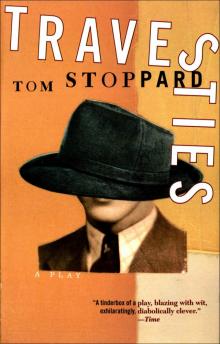 Travesties
Travesties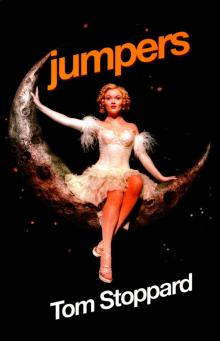 Jumpers
Jumpers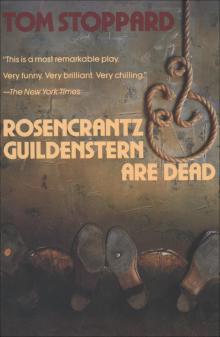 Rosencrantz and Guildenstern Are Dead
Rosencrantz and Guildenstern Are Dead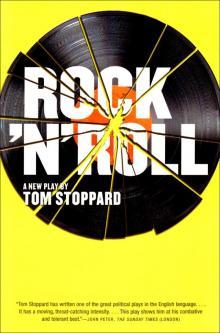 Rock 'N' Roll
Rock 'N' Roll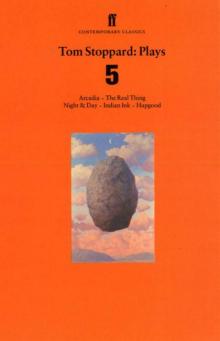 Plays 5
Plays 5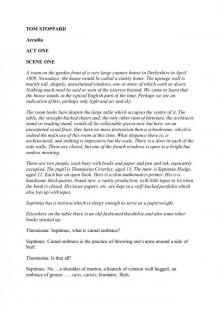 Arcadia
Arcadia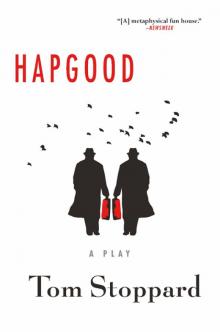 Hapgood
Hapgood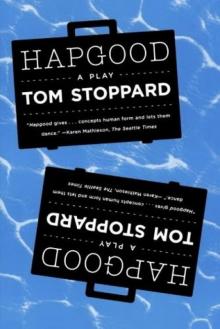 Hapgood: A Play
Hapgood: A Play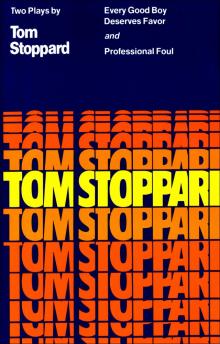 Every Good Boy Deserves Favor & Professional Foul
Every Good Boy Deserves Favor & Professional Foul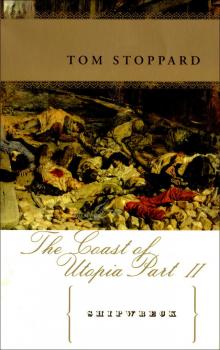 The Coast of Utopia: Voyage, Shipwreck, Salvage
The Coast of Utopia: Voyage, Shipwreck, Salvage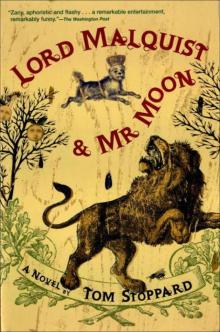 Lord Malquist & Mr. Moon
Lord Malquist & Mr. Moon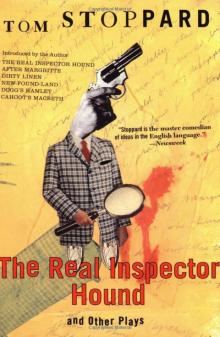 The Real Inspector Hound and Other Plays
The Real Inspector Hound and Other Plays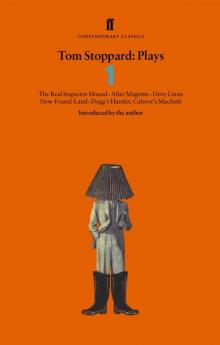 Tom Stoppard Plays 1
Tom Stoppard Plays 1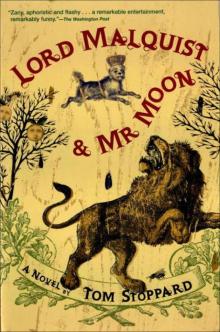 Lord Malquist & Mr. Moon: A Novel
Lord Malquist & Mr. Moon: A Novel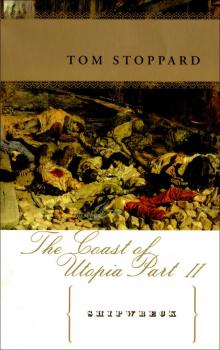 Shipwreck
Shipwreck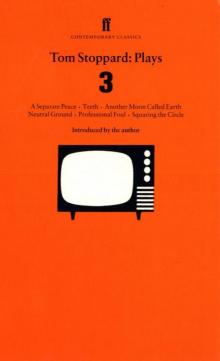 Tom Stoppard Plays 3
Tom Stoppard Plays 3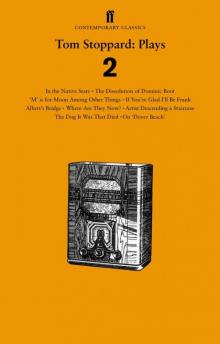 Tom Stoppard Plays 2
Tom Stoppard Plays 2 Rosencrantz and Guildenstern are dead. Arcadia
Rosencrantz and Guildenstern are dead. Arcadia